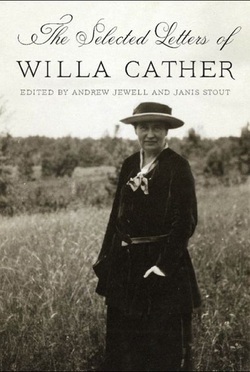My Book World

Author Willa Cather was born in 1873 and died in 1947. Her family moved from Virginia to Red Cloud, Nebraska when she was a child. Throughout her life, though she lived and worked in the Northeast, she would travel back to the plains and later to California to visit the family to whom she was devoted. Though she toiled as an editor and for a few years as a public school English teacher, she supported herself primarily through the sales of her own work.
Her letters reveal a powerful person, one in charge of her own life from beginning to end. She and her longtime companion lived in various quarters in the Northeast and in Europe in order for Cather to research and write her considerable oeuvre. Among her best selling works are My Ántonia, O Pioneers, and Song of the Lark. In 1922 she won the Pulitzer Prize for One of Ours.
As I said a number of posts back, I believe the perusal of such letters can give the reader yet another look at an author’s life. In this case, Cather is addressing her publishers, editors, her parents (who live long lives), siblings, and dear friends. Much of what she writes is travelogue—as she spends much time on ships between the US and Europe, trains spanning the country from coast to coast—yet her letters are serious works of art themselves. The impression one walks away with is that she is an intelligent, business-savvy, and caring person. Yet she is no one’s fool. In letters to Alfred Knopf, she gingerly weaves her way through all the issues as to why she should have more money for a certain book or why she needs an extension, and because she is such a fine communicator and person, she often wins the battle. However, if she doesn’t, she gives in gracefully as part of the larger game. She moves on without holding a grudge.
If you’ve enjoyed reading her fiction and like literary biography, you’ll take this book to heart, all 676 pages. If not you may learn to love her through her letters. I list below a few nuggets I found interesting—largely because her views of teaching seem to strike a familiar tone.
The editors: “By positioning herself not as a ‘popular’ writer but as literary artist, she was able to give herself the space to be such an artist while also financially succeeding in the marketplace” (Loc 78, Kindle).
The editors: “The voice of Cather’s correspondence is in many ways strikingly consistent with the voice of her fiction: it is confident, elegant, detailed, openhearted, and concerned with profound ideas without relying on heavily philosophical language” (Loc 201, Kindle).
Cather: “The first month of teaching is at an end and I have about decided to let some one else take up the good work for the rest of the year. I want to go home to Red Cloud and work for awhile. I know now that I can teach, and that better than I had expected, but I can’t help taking the matter seriously and I doubt whether that pays in a High School where the salary means ultimate financial ruin” (59).
Cather: “Teaching school is a quieting, settling, ageing [sic] occupation, that makes one reliable and thoughtful and consciencious [sic], but it is not good for one[‘]s disposition” (77).
Cather: “Long ago, in my lonely struggling years when I was learning to write and nobody understood what I was trying to do, and I didn’t understand myself,—I used to think bitterly, (oh so bitterly!) that no matter how well I got on, I could somehow never write the kind of thing that would seem interesting or true to my own people, and they would never know how much I had loved them” (323).


 RSS Feed
RSS Feed